Every year, friend-of-the-site David Collum writes a detailed "Year in Review" synopsis full of keen perspective and plenty of wit. This year's is no exception. As with past years, he has graciously selected PeakProsperity.com as the site where it will be published in full. It's quite longer than our usual posts, but worth the time to read in full. A downloadable pdf of the full article is available here, for those who prefer to do their power-reading offline. -- cheers, Adam
Background
“I don't write about what I know: I write to find out what I know.”
~Patricia Hampl
Every December, I write a Year in Reviewref 1–7 first posted on Chris Martenson’s website Peak Prosperityref 2 with a secondary posting at Zero Hedge.ref 3 What started as a brief introspective shared with a handful of e-quaintances has mutated into a detailed account that has accrued as many as 100,000 clicks. Each year I try to identify themes in events that evolve. As the title suggests, I have not seen a year in which so many risks—some truly existential—piled up so quickly. Each risk has its own, often unknown, probability of morphing into a destructive force. Groping for a metaphor—I love metaphors and similes—I feel like we’re in the final throes of a geopolitical Game of Tetris as financial and political authorities race to place the pieces correctly. But the acceleration is palpable. The proximate trigger for pain and ultimately a collapse can be small, as anyone who’s ever stepped barefoot on a Lego knows.
“If the world seems to be turning ’round faster than ever, you’re not alone. Grab hold of something, it shows no sign of abating.”
~Josh Brown, CEO of Ritholtz Wealth Management
My lack of credentials is absolute—the Paris Hilton of finance—but has not prevented me from being a poseur in the Wall Street Journalref 8 and The Guardianref 9 and on Russia Today,ref 10,11 and a host of podcasts.ref 1 On the heels of a threesome with Bob Lehman and Grant Williams on BTFD.tv following last year's review,ref 12 2014 started with a bang on BTFD.tv in a New Year’s Eve hexabox shared with a trader who cut his chops selling dime bags on street corners and a person who on close inspection appears to trade the trannies.ref 13 Subsequent interviews on Peak Prosperity,ref 14 Wall Street for Main Street,ref 15 Kunstlercast,ref 16 Stansberry Radio,ref 17 and Red Pill Radioref 18 offered more opportunities to Milli Vanilli my way through finance and politics. I shared the podium with T. Boone Pickens and Alex Jones as an invited speaker at the Stansberry Investment Conference: “Boone. I agree with you. That first billion is being a bitch.”ref 19 (I took another swipe at the Roth IRA.) I almost made Rolling Stone, but Matt left me at the altar. (I still can't get that tune out of my head.) As this review is being uploaded to the web, I’m doing an interview with Erin Ade on Boom Bust (Russia Today), which will be posted on YouTube.ref 20
“Risk means more things can happen than will happen.”
~Elroy Dimsen, London Business School
Contents
Footnotes appear as superscripts, with the full reference for each provided in the Links section. The whole enchilada can be downloaded as a single PDF here or viewed in parts via the hot-linked contents as follows:
Part 1:
- Background
- Content
- Sources and the Fourth Estate
- On Conspiracy Theorizing
- Investing
- The Economy
- Bending, Breaking, and Broken Markets
- Precious Metals
- Energy
- Personal Debt, Savings, and Retirement
- States and Municipalities
- The Bond Caldera
- Argentina Versus the Bond Vultures
- Inflation Versus Deflation
Part 2:
- Wealth Disparity
- Banks and Bankers
- AIG
- The Federal Reserve
- Baptists
- Bootleggers
- Europe
- Asia
- China
- Japan
- ISIS
- Russia
- Ebola
- Government
- Clintons
- Barack Obama
- IRS Scandal Part Deux
- Bundy Ranch and Ferguson
- Militarization of Police
- Civil Forfeiture
- Civil Liberties
- Conclusion
- Books
- Acknowledgments
- Links Part 1 | Part 2
Each review begins with an account of my efforts to get to a financially secure retirement. I continue to cling doggedly to my belief in the Austrian business cycle theory and the need for a hard-asset-rich portfolio despite two consecutive years of decidedly lousy returns. The bulk of the review, however, describes thoughts and observations—just the year’s events told as a narrative. The links are copious, albeit not comprehensive. Some are flagged with enthusiasm (must see). I am a quote junkie: quotations capture people’s thoughts in their own voices, and they do the intellectual heavy lifting.
I try to avoid themes covered amply in previous reviews. Some topics seem to go into quiescence, whereas others move to center stage without warning. Precious metals are a personal favorite. Every year seems to pick up a theme, possibly reflecting the news cycle (although my sources are anything but mainstream). Geopolitics were huge this year. Sections titled Baptists and Bootleggers, Bankers, and the Federal Reserve cover the gamut of human folly. Owing largely to central banking largesse, the system seems to be wound tighter than a golf ball. The third and hopefully final leg of a secular bear market that began in 2000 may be visible—but record debt, bank interventions, low interest rates, and the onset of global currency wars may simply be bricks in the Wall of Worry. Naysayers relentlessly remind us how many terrible things have not happened. All year I kept thinking of a poignant declaration:
“Hey guys: It's a dud!”
~Lt. Red Winkle en route to becoming pink mist in Pearl Harbor
I finish with synopses of the books that shaped my thinking. You will not find any new releases from Geithner or Clinton: I am selective.
Sources and the Fourth Estate
“There are people that don’t see the use in Twitter, and I get that. Who wants to mentally joust with the smartest, most relevant, and most connected people in the world?”
~Tony Greer, Buckingham Research Group
Before laying out a heap of content myself, a few comments about sources are warranted. Despite occasional bursts of glory and some serious journalism salted throughout the mainstream media, we have witnessed rot. The only commentary on TV worth expending ATP on is The Daily Show and its spawn. I do not need right- or left-wing propaganda. It is nauseating, especially given that so many reporters and academicians feigning impartiality are said to be on the payroll of political parties.ref 21 The former editor of one of Germany’s main dailiesref 22 admitted to being “bribed by [American] billionaires,” and a CIA operative referred to journalists as “cheaper than a good call girl.”ref 23 The once-illustrious CNBC ratings are now plummeting for a simple reason: it sucks. Simon Hobbs and Steve Sedgwick can put a sock in it. Mandy suggested that “over indebtedness comes from financial illiteracy.” Steve Liesman illustrated it by stating that “debt is the great bridge between working hard and playing hard in this country.” I can feel my IQ dropping. Wayne Rogers of Mash fame hammered a Fox host by noting, “You're a moron because you talk too much, and you don't think through it.”ref 24 Well said, Wayne.
@DavidBCollum Ask Fisher why a committee of bureaucrats sets the price of capital.
@steveliesman Because the alternative is the vagaries of the supply of gold.
My primary sources are an eclectic gaggle of bloggers—guys like Michael Kriegerref 25 and Charles Hugh Smithref 26—and select news consolidators. My actions speak to my enthusiasm for Peak Prosperity.ref 27 The 500-pound gorilla is Zero Hedge—edgy, ahead of the curve, and accurate enough. Newcomers this year include David Stockman's ContraCornerref 28 and a new Internet news network called RealVisionref 29 created by Grant Williams and Raoul Pal. Twitter may or may not be a good investment, but a good Twitter feed is a gateway to the world. You never know what you'll find:
“@zerohedge Ha ha, you are such a dickhead . . . it's wonderful.”
~David Andolfatto (@dandolfa), senior vice president, director of research, Federal Reserve Bank of St. Louis
“I still think we should buy them. He is on your schedule for Dec 15 or 16—we will need to sell him. I have a plan.”
~Anthony Noto (@anthonynoto), CFO of Twitter, struggling to keep tweets and direct messages separate
On Conspiracy Theorizing
“I’m not going to censor myself to comfort your ignorance.”
~Jon Stewart
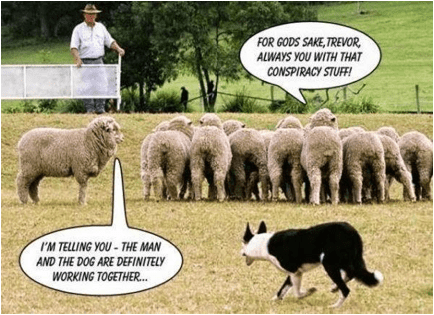
These markets are making me a little schizophrenic—like Jerry (Mel Gibson) in Conspiracy Theory—so this blog is really a group effort. But I vehemently denounce those who claim there are no conspiracies and who try to protect their beliefs by labeling the rest of us conspiracy theorists. I could cite famous folks who share my views, but on this one I stand alone: Men and women of wealth and power conspire. Period/full stop. If a market can be rigged, it is being rigged. If numbers can be cooked to advance an agenda they probably are being cooked. It is usually the glib intellectuals—guys like Cass Sunsteinref 30—who denounce conspiracy theories as intellectually childish and those who consider them as diseased. You are trying to shut me up with a pejorative label. I will let one of the iconic educators of our time respond:

Investing
“You have to decide whether to look like an idiot before the crash or an idiot after it.”
~John Hussman, Founder of Hussman Funds
I have changed little in my portfolio since last year. The only consequential change is that I resumed purchasing physical gold after a decade-long hiatus, increasing the total tonnage by approximately 20%. Owing to life's events, I have a dramatically enhanced cash position and a relatively small standard equity index. I am in no rush to alter the cash position. Rebalancing continues to occur primarily through market forces and by splitting my retirement contributions into equal portions cash and energy equities.
Precious metals etc: 21%
Energy: 10%
Cash equiv (short term): 60%
Standard equities: 9%
My net change in wealth at the time of this writing (12/15/14) of -1.2% is poor when compared to the S&P 500 (+8%) and Berkshire Hathaway (23%) for the third year in a row. Also for the third year in a row, the return on the S&P gains arose largely from p/e expansion fueled by gargantuan leveraged stock buybacks (see below). Those crazy enough to challenge the investor flash mob by shorting this market have absorbent Pampers slapped on what used to be their faces. Corrections elicited phrases like “levels not seen in two weeks.”
Despite a very large cash and physical gold (+1%) positions, a small but strong standard equity position, and some added savings keeping me near even for the year, the carnage inflicted by vicious selloffs in the commodities smarted. At the time of this writing, my year-to-date results were influenced by gold (1%), silver (-12%), the XAU (-18%), the XLE (-16%) as a proxy for the energy sector, and the XNG as a proxy for the natural gas sector (-15%). Metal investors were bludgeoned by a late season sell-off and self-doubts and were berated by pretty much everybody on the planet, prompting CNBC to underscore the “vomiting camel” chart pattern (Figure 1). As social indicators go, that one could have called the gold market bottom.
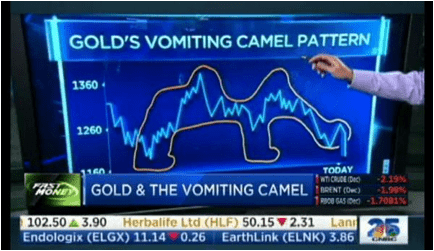
Figure 1. Emetic dromedary pattern.
In a longer-term view, the total gain in personal wealth (including savings but excluding a large, positive one-time item) of 335% since January 1, 2000—the very challenging 15 years that followed the good times—compares favorably to the S&P (40%; ex-dividends) and Berkshire (329%, which includes accrued savings). It is going to take a crushing market event to regain a large lead I had on Buffett at one point. I remain a believer in the secular precious metal bull (albeit with white knuckles and self-loathing) for a rather simple reason: I think central bankers will destroy us. I see a secular equity low in our future, and the only way to exploit it is to park on cash and wait and wait and wait some more. In fact, that's one of the great advantages amateurs have over the temporally sensitive pros. I can stay irrational longer than the markets can stay liquid. I hope someday to exploit the hell out of opportunities in the energy sector that are being offered to us on a platter by the Saudis and the Obama administration. Until then, the Saudis can keep crushing the domestic energy markets (see below), and I will continue to white-knuckle my way through this mess.
King Arthur: Look, you stupid bastard, you've got no arms left!
Black Knight: Yes I have.
King Arthur: Look!
Black Knight: It's just a flesh wound.
~Monty Python and the Holy Grail
The Economy
“By 2011, it was clear—at least to me—that the Great Recession was no longer an accurate moniker. It was time to begin calling this episode the Lesser Depression.”
~Bard Delong, economist at UC Berkeley, channeling James Rickards
“I am delighted to join you at a time when, despite the effects of the severe winter weather, the economy is on the firmest footing it has been on since the recovery began.”
~Charles Plosser, Federal Reserve Bank of Philadelphia, channeling David Lereah
We have the best economy money can buy. Fed governor John Williams suggested that “we are actually getting closer to getting at a normal economy.” How would we know with you Fed plonkers in the way? According to David Stockman, total revenue has grown by just 31% since 2009 while profits have skyrocketed by 253%.ref 31 We either did some serious regression to the mean from '09 to the present or will be doing so going forward. World-record profit marginsref 32 suggest regression to the mean is in our future. I did a quick survey of the Forbes 100 and estimate that 17% are explicitly in finance. Others are called “diversified.” I've gotta wonder if the economic gains are from various unconstructive economic pursuits (cf. Japan in the 1980s). Caveat aequitas emptor: if left unchecked, business cycles die of old age, and we are in the sixth longest (of 34) since 1854.ref 33 If you want some serious doom porn, check out a few of Michael Snyder's Listicles of Horror (my moniker) posted at The Economic Collapse Blog and secondarily at Zero Hedge.ref 34,35,36 The guy sees dead people.
As always, the difficulty is culling fact from fiction. In May, the ISM manufacturing indicators dropped precipitously and unexpectedly. A few hours after starching some more socks, ISM announced “my bad” and said that recalculations show that the economy is accelerating.ref 37 Nonetheless, economic indicators began missing estimates by wide margins.
Maxim: Facts miss pundit estimates rather than vice versa.
Mavens in the US blamed bad weather for their complete inability to hit the dartboard. Oddly, German pundits blamed their joblessness on good weather,ref 38 whereas Goldman suggested that the Germans actually have strong growth . . . because of the weather.ref 39 Fed governor Plosser says the economy is great “despite the effects of severe weather.”ref 40 The CEO of Walmart doubts the weather argument altogether, instead suggesting that everybody is unemployed and broke.ref 41 Charles Dudley Warner insightfully noted, “Everybody complains about the weather, but nobody does anything about it.” I suspect the vital signs of the economy are stable, albeit with help from a high-capacity monetary respirator.
The weather is whacking California. One of our breadbaskets is going bone dry owing to a multiyear, high-sigma (500-year) drought. Analogies to the Dust Bowl are inescapable.ref 42 Some towns are shipping in all water by truck.ref 43 California will soon run out of Nevada and Oregon's water. One orange grower bulldozed 400 acres of trees (why?), suggesting that “if this persists in the next year, the devastation . . . will be biblical.”ref 44 California halted fracking because it may be contaminating aquifers.ref 45 (I must confess that of all the risks of fracking, destroying a big aquifer tops the list.)
Of course, housing is considered central to our economy. Maybe I have Assburger's syndrome or 80HD, but I go nuts trying to figure out whether housing is strong or weak. Choose an indicator and make any case you want. Owens Corning reported a weakness in roofing materials: the corporate numbers don't lie.ref 46 (Just kidding. Sure they do.) Some plots show existing home sales rising; others show existing home purchases rising. Dudes: they're the same numbers—a kind of housing velocity that may offer evidence that the market is loosening finally. That said, 20 million homeowners are still underwater,ref 47 rendering them professionally immobile. A nice list of the riskiest real estate markets in country shows Hartford, Connecticut, leading the pack with a potential downside of 35%.ref 48 (Canada and England now make us look like pikers, however, given that their busts remain prospective.)ref 49,50 And remember that iconic plot of mortgage resets foreshadowing (to those paying attention) the '08–'09 crisis?ref 51 Well the resets are back—$200 billion worth of resetting home equity lines of credit (HELOCs).ref 52 When the Fed finally normalizes rates, price discovery is gonna be a real bitch. The Fed never had an exit strategy.
Some argue that labor numbers are cooked like every other stat. That gets you labeled a conspiracy theorist (and got me labeled “pathetic”). John Crudele cites a Bureau of Labor Statistics whistle-blower claiming “I wouldn’t trust any data from the Census Bureau.”ref 53 Who knows, but they seem contrived. Government indicators of employment aside, the labor participation rate continues to plummet (Figure 2). We appear to be unwinding the gains from the feminist revolution, except it's men hitting the sofa with pork rinds and a remote in hand.ref 54 It was claimed and broadly disseminated that 11 states had more people on welfare than employed (despite rising numbers staffing welfare offices), but it might not be that simple.ref 55 The rallying cry of the boomers—”I'll work till I drop”—needs to include “or until I lose my job.” That said, the aging boomers are Hoovering up most of the new jobs (Figure 3).ref 56 Gotta wonder whose couch the millennials will crash on when their parents go to the light with unpaid mortgages. The dichotomy of part-time versus full-time jobs continues to distort perception. By example, the 800K part-time jobs gained in June were offset by 500K full-time jobs lost.ref 57 Total hours worked in this instance is crudely a wash (which is evidence of stagnation), but the lost benefits are definitely bad, and it has been disastrous long term (Figure 4). Walmart just cut health insurance for some 30,000 part-time employees,ref 58 causing serious angst among those who hate Walmart out of principle. At least we have Obamacare.
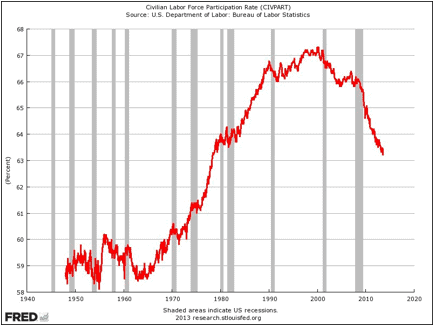
Figure 2. Labor participation rate.
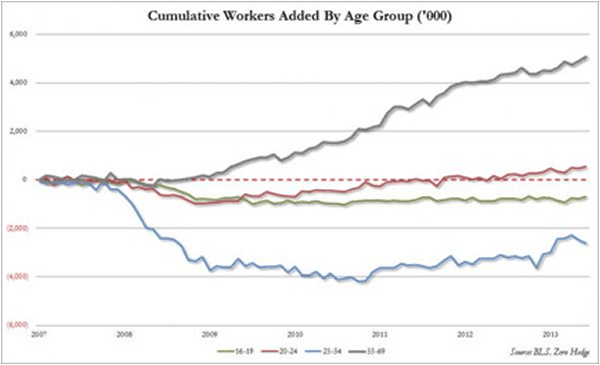
Figure 3. Joblessness by age.
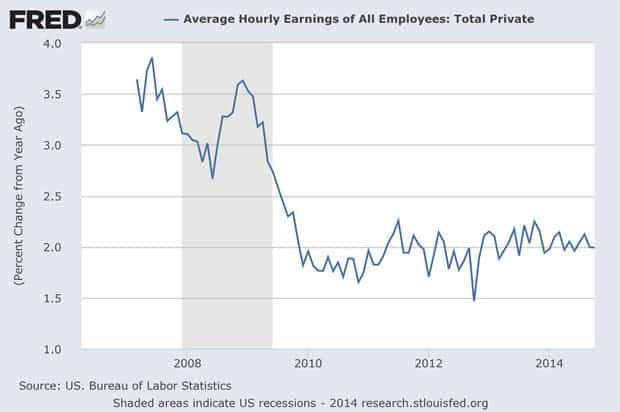
Figure 4. Total hours worked.
Attempts to wrap my brain around the economy sometimes reveals moments of hilarity and absurdity. A “highly regarded study” found that children entering the job market today have the same chance of climbing the income ladder as children born in the 1970s.ref 59 There is nothing quite like a decades-out extrapolation unguided by actual data. Prominent economist Justin Wolfers posted very cool plots showing that happiness correlates with earning power.ref 60 OK. Money makes me happier too, but I am surprised that earning $500K gives you a 100% chance of being happy. As Einhorn said to Bernanke, “ How do you get to 100 percent certainty about anything?”ref 61 Graphically slick charts like Wolfer's can seem very compelling and still be dubious (Figure 5).ref 62 A Pew Foundation study concluded that teen pregnancies are good for the economy and wealth creation.ref 63 They hedge their euphoria by noting that “it's obviously unrealistic to hope that the U.S. can return to the teenage birth rate of the Baby Boom.” One can only hope. As the cops often say, “spread 'em.”
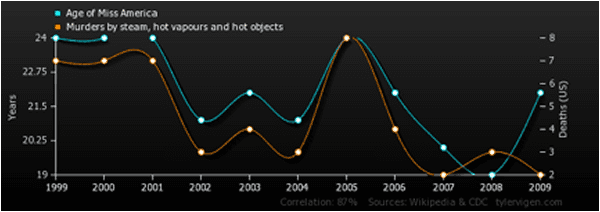
Figure 5. Obviously strong causal relationship between Miss America and deadly hot vapors.ref 62
Bending, Breaking, and Broken Markets
“Looking at Wall Street stock and bond trader screens, the world looks like a model of stability.”
~Jon Hilsenrath
“Given how sensitive markets are to headlines at the moment, there are no charts to send today.”
~Citi technical analysts
IPOs are always great entertainment because 80% of these nuggets of speculative bliss don't have earnings.ref 64 Alibaba (BABA), the Amazon of China, opened at the monumental 20× sales and puttered around for a while until it caught a late-year ramp. The shares, however, are a derivative—they offer no direct claim to ownership or a stream of revenue—suggesting that any measure of valuation is meaningless.ref 65 Twitter opened with a lot of fanfare, sloshed around, and finished the year marginally up. Peter Thiel noted that Twitter is a “horribly mismanaged company—probably a lot of pot-smoking going on there. But it’s such a solid franchise it may even work with all that.”ref 66 Put in tight stops, Peter. The IPO of Vascular Biogenics opened, tanked, and was unwound—they took a mulligan.ref 67 Presumably the wrong people got hurt. Soon after their IPO, the founders of GoPro cameras, circumvented the lockout period by placing shares in a family trust and selling them.ref 68 Irritated investors sold the news but soon forgave them. Pre-IPO Snapchat looks like a real gem with no business model, no revenue, no profits, and a $10 billion valuation.ref 69
“Sorry if you missed your IPO window. Don’t worry, we’ll blow up another one of these bad boys soon enough.”
~Josh Brown (@reformedbroker), CEO of Ritholtz Wealth Management
Stock buybacks have dominated the market. According to the most recent Capital IQ data, the single biggest buyers of stocks in the first quarter were none other than the companies of the S&P 500 itself—$600 billion this year alone—simultaneously driving equity prices up and capital expenditures (Capex) down.ref 70 How ironic. Years ago Peter Lynch used share buybacks as evidence insiders knew their shares were underpriced. Those were quaint times. Now they are used to boost share price by eroding balance sheets; investors profess to understand p/e ratios but are oblivious to balance sheet rot. Some estimate that, accounting for leverage, all earnings of the S&P are being plowed back into repurchase programs.
IBM is the poster child, buying back almost $40 billion while nuking its balance sheet with debt.ref 71 Apple completely gutted its huge cash hoard buying back shares,ref 72 which should stress holders of 30-year Apple debt issued when the balance sheet was strong.ref 73 Oracle missed earnings and revenues but borrowed $10 billion to buy back shares.ref 74 Oracle “returned” $21 billion of borrowed money in two years via buybacks and spent only $1.2 billion on Capex,ref 75 making it essentially the largest royalty trust in the universe. Ford has $90 billion in net debt (debt minus cash) and is buying back shares—the functional equivalen
This is a companion discussion topic for the original entry at https://peakprosperity.com/2014-year-in-review/

